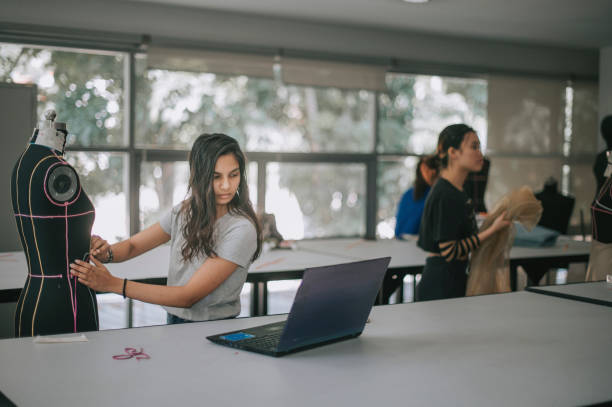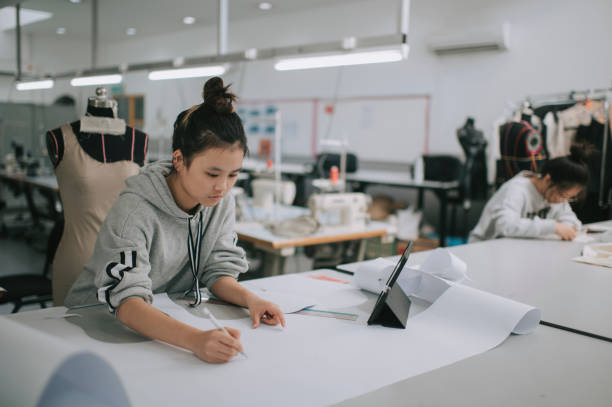The Crucial Role of Fashion Education in Shaping Future Industry Professionals
Fashion education is more significant than it may initially appear. It provides individuals with the knowledge and skills necessary to thrive in the ever-evolving fashion industry. This article explores why fashion education is crucial, its benefits, and how it shapes aspiring fashion professionals.
Understanding the Role of Fashion Education

Fashion education plays a foundational role in equipping students with the theoretical knowledge and practical skills needed to succeed in the fashion industry. From learning about design principles to understanding market trends, fashion education covers a wide range of subjects that are essential for producing well-rounded professionals. This multi-faceted education helps students navigate the complexities of the fashion world and prepare for various career opportunities.
The Benefits of Attending Fashion Schools
Attending a fashion school provides numerous advantages. Firstly, students gain access to state-of-the-art resources and facilities that enhance their learning experience. Secondly, they get the opportunity to be taught by experienced professionals who bring real-world insights into the classroom. Thirdly, fashion schools often have strong networks and partnerships within the industry, providing students with invaluable networking opportunities. Finally, attending a fashion school can significantly increase a student’s employability in a competitive job market.
Skills Acquired Through Fashion Education
Fashion education equips students with a diverse skill set that is essential for their career success. Among these skills are:
- Design and Creativity: Learning to express ideas through various mediums and design tools.
- Technical Proficiency: Understanding garment construction, textiles, and production techniques.
- Business Acumen: Gaining knowledge about fashion marketing, management, and entrepreneurship.
- Trend Analysis: Developing the ability to anticipate and influence fashion trends.
- Communication: Enhancing the ability to convey ideas clearly and effectively, both visually and verbally.
How Fashion Education Shapes Future Professionals
Fashion education doesn’t just teach technical skills; it also shapes students’ mindsets and professional attitudes. Through rigorous coursework and hands-on projects, students learn to think critically and creatively. They develop problem-solving abilities and learn how to work under pressure, qualities that are highly valued in the fashion industry. Additionally, working on collaborative projects teaches the importance of teamwork and communication, further preparing students for real-world scenarios.
The Role of Internships and Real-world Experience
Internships and practical work experience are integral components of fashion education. These opportunities allow students to apply their classroom knowledge in real-world settings, gain valuable industry experience, and build professional portfolios. Many fashion programs have established partnerships with top designers, retailers, and fashion houses, providing students with internships that can often lead to full-time employment. This blend of education and practical experience ensures that graduates are industry-ready.
Conclusion
In conclusion, fashion education is indispensable for anyone looking to make a mark in the fashion industry. It provides the theoretical foundations, practical skills, and industry exposure necessary to succeed. Whether through design innovation, business expertise, or trendsetting, fashion education plays a vital role in shaping the future of the industry. Investing in a comprehensive fashion education is a step towards a rewarding and dynamic career.
FAQ
What subjects are typically included in fashion education?
Fashion education typically includes subjects such as fashion design, garment construction, textiles, fashion history, trend analysis, marketing, and business management.
Can I succeed in fashion without formal education?
While it is possible to succeed in fashion without formal education, having a structured learning environment and access to industry resources through fashion schools greatly enhances one’s skills and opportunities.
What are the career prospects after a fashion education?
Career prospects include roles such as fashion designer, stylist, textile designer, fashion buyer, merchandiser, fashion marketer, and brand manager, among others.
How important are internships in fashion education?
Internships are extremely important as they provide real-world experience, help build professional networks, and can lead to job opportunities post-graduation.
Is fashion education only about design?
No, fashion education covers a broad spectrum that includes design, but also business, marketing, trend analysis, and production, providing a holistic view of the industry.
